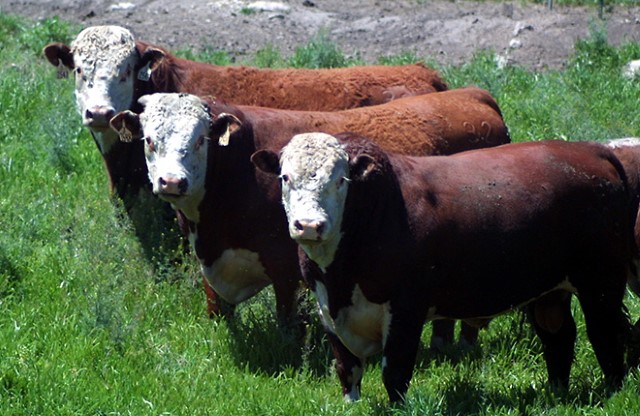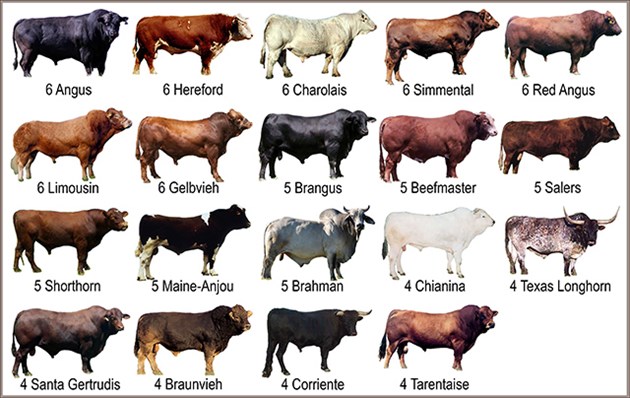Online Cattle Genomes Reveal Disease Mutations
Agricultural Research Service (ARS) scientists in Clay Center, Nebraska, have sequenced the whole genomes of a panel of 96 bulls—representing 19 U.S. cattle breeds—and made the data accessible online.
The result is a searchable and publicly viewable genomics resource of a broad cross section of U.S. beef cattle that will make it easier for scientists to identify genes associated with traits that are important to breeders and ranchers. The 19 breeds include Angus, Hereford, Brangus, Brahman, and Texas Longhorn.
“Our goal was to include animals that represent the breadth of diversity in U.S. beef cattle, not just the top breeds,” says Michael Heaton, a microbiologist with ARS’s U.S. Meat and Animal Research Center (USMARC).
Heaton started building the panel in the 1990s but only began the genomic sequencing of all 96 animals in the last 2 years, with help from USMARC chemist Timothy Smith. The web-based platform was designed by Theodore Kalbfleisch, an associate professor at the University of Louisville in Kentucky.
|
|
“Our primary interest is infectious disease and animal health,” Heaton says. “Typically, diseases affect only a small percentage of animals, but the loss of any animal can be expensive. We wanted to see if we could root out those relatively rare genetic defects that cause a few animals to get sick and die. To do that, we had to gather all the genetic diversity in U.S. cattle to find those ‘bad’ genes.”
Using the panel, Heaton and his colleagues analyzed a bovine gene associated with brisket disease. Also known as pulmonary hypertension, mountain sickness, and dropsy, the disease results from elevated pulmonary arterial pressure caused by lack of oxygen. It commonly occurs in cattle raised on ranches at altitudes of at least 5,000 feet above sea level. There is no cure for pulmonary hypertension, which also occurs in humans.
Scientists were able to identify previously unpublished mutations in a gene associated with brisket disease. Such an analysis used to take 3 months at a cost of $3,000 and can now be done in 3 hours for free, Heaton says.
The idea is that if a certain version of the gene is “bad,” it can be added to a genetic test for selecting the best breeding animals. Producers can test their animals and make sure they choose breeding stock with the “good” version, Heaton says. “This is important to producers, because brisket disease is occurring more frequently at lower altitudes. The cattle panel genomes can be used to discover gene mutations that escalate this problem.”
Researchers can readily inspect gene mutations reported in one breed, evaluate them in other breeds, and search for additional mutations. This same approach can also be applied to genes affecting production traits, like growth and reproduction.
“Many producers are using DNA testing to decide which animals to breed, so adding this gene or future genes to tests is a natural,” Heaton says.
The sequence is accessible at this link. The research appeared online in F1000 Research in 2016.—By Sandra Avant, ARS Office of Communications.
Key Facts
- ARS scientists sequenced the genomes of 96 diverse bulls.
- The information will improve genetic tests for diseases.
- Genetic tests help producers breed healthier animals.
Full Story








